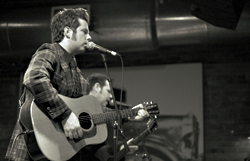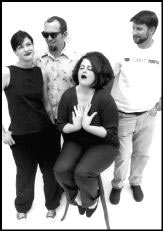In order to take another shot at making music, Mark Pickerel decided he could no longer sell it. So last year, Pickerel closed the doors on an Ellensburg, Wash., institution: Rodeo Records, the Main Street music shop he opened soon after leaving the illustrious and impetuous Screaming Trees 14 years earlier.
What was bad news for Ellensburg residents looking for their independent fix turned into one of the best records of the half-year—Pickerel’s solo debut, Snake in the Radio, which finds the affable drummer stepping to the microphone with a jumble of intoxicating love songs and blues-influenced parables.
With a Chris Issak tickle in his throat and a sly, subtle baritone that’s a few rungs up from Lee Hazlewood, Pickerel narrates cunning character sketches over a spaghetti-Western ensemble of guitar, pedal steel, mandolin, and organ.
Fourteen months in the making, Snake began at a crossroads in Pickerel’s life. “I basically became homeless by choice,” he says of the period following Rodeo’s closing. “I lived out of my car for the last six months of the recording process.”
Back and forth over the pass, Pickerel made sporadic treks to Steve Fisk’s North Seattle home. The two first met in the mid-’80s after Pickerel penned a fan letter to an address he found on the sleeve of a 7-inch by Anonymous, Fisk’s former band.
Fisk had produced the first three Screaming Trees records, and this time he broke customary processes to get Pickerel’s solo debut in the can.
“We recorded everything in my house, where normally I just do mixing and vocal overdubs there and record the bulk of a record elsewhere,” says Fisk. “It basically was done in a room that’s 8 by 10 by 12, with three or four people playing live and a grotesque use of compression.
Pickerel took an anomalous approach to balancing his roles as drummer and frontman, performing the instruments live with a click track and later adding the drums and vocals. “Some days,” he says, “it was like we started with the roof and worked our way down to the foundation.”
Snake‘s 11 tracks were culled from a body of 50 to 60 Pickerel compositions that ranged as far back as 1993. They include the lazy melodic opener, “Forest Fire,” the dashing rocker “A Town Too Fast for Your Blues,” and the title track, a bitter, age-old grievance about the being who “poisoned all the airwaves.”
“We looked for a group of songs that fit well together out of more than a decade’s worth of songwriting,” Pickerel says. “But there were some songs, like ‘You’ll Be Mine,’ which fell out of me, literally.”
Shackled by a day of “weird energy” between him and his girlfriend, Pickerel was spending an afternoon at the Frye Museum when the words came pouring out: “Meditating on a painting when you never walked through the door.” Energized by a pulsating, secret-agent-man spy riff, “You’ll Be Mine” turned into Pickerel’s “love/stalker song,” and one of Snake‘s best.
Pickerel’s choice of players is testament to two decades in and around the local scene. Johnny and Jim Sangster star on guitar and bass, respectively, with Micah Hulscher of the Dusty 45’s on keyboards and Swiss pedal-steel player Maggie Bjorklund laying down a ’70s country-western groove.
The package ultimately found a home at Chicago-based Bloodshot, a label Pickerel admired from his record-store days.
“I always felt at home in their company,” says Pickerel. “I was interested in several labels, but they were the one that showed total enthusiasm, passion, and conviction for my music, and for building a professional relationship with me.”
Based on the buzz created by Snake in the Radio and Mark Pickerel’s eagerness to make music again, it’s a relationship that could last a while.






